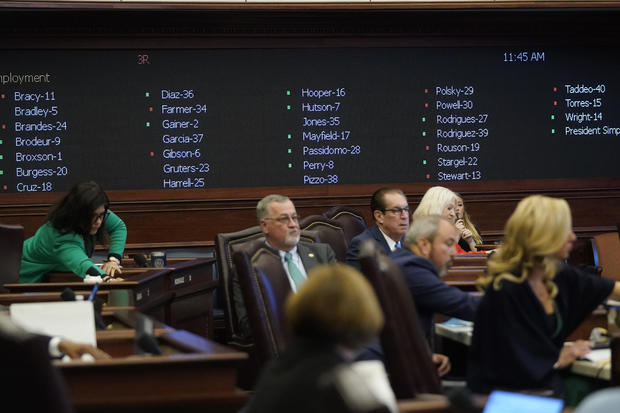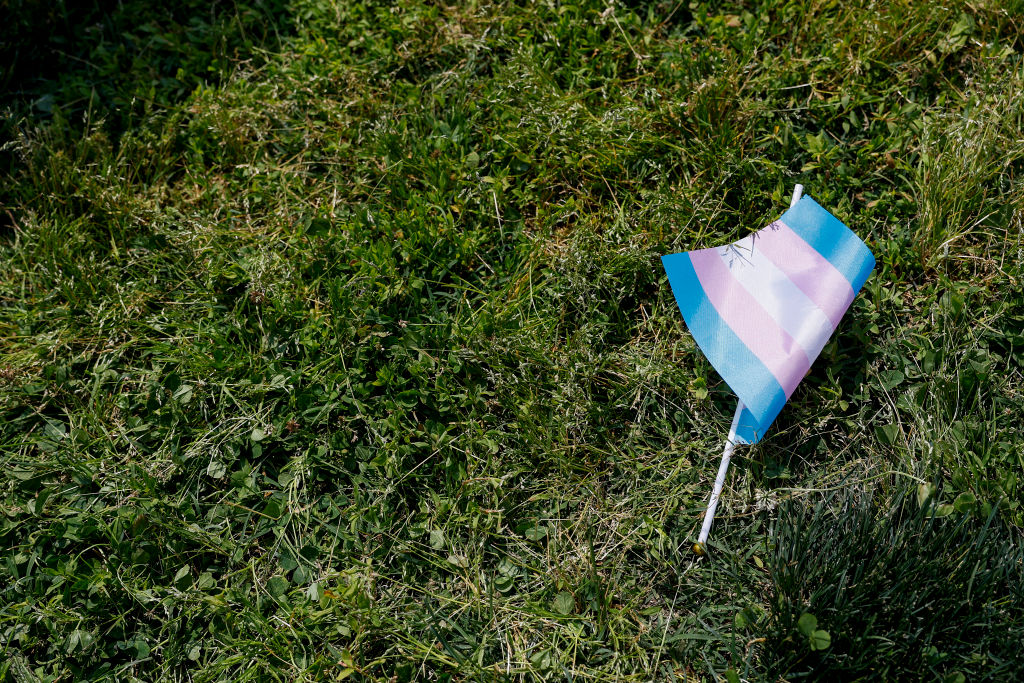Teachers speak out against Florida's "Parental Rights in Education" bill
Update: Florida Governor Ron DeSantis signed the bill into law on Monday, March 28.
Some of America's most highly regarded teachers are speaking out against Florida's "Parental Rights in Education" bill, and a growing number of LGBTQ teachers and allies across the country are worried about the impact this and similar legislation could have on students.
Florida's House Bill 1557 — known by critics as the "Don't Say Gay" bill — prohibits classroom instruction on sexual orientation or gender identity in kindergarten through third grade, or in older grades in "a manner that is not age-appropriate or developmentally appropriate."
Kentucky's 2022 Teacher of the Year, Willie Carver, drafted an open letter, signed by more than 200 teachers who've been honored by their state as a current or former Teacher of the Year, condemning policies that place "politics, misconceptions, teacher comfort, and other concepts above the needs of students." The signatories represent about 50 states and territories.
An excerpt from the letter states that they "stand firmly against any practice or legislation that silences or opposes references to LGBTQIA+ people or to their access to care, such as is occurring in Florida and Texas."
Carver told CBS News, "There's a whole host of bills that are very problematic. Florida's is the most brazen. It is very specifically outlawing what it calls 'discussions,' which is a pretty vague term, of LGBTQ people through third grade."
Even though Kentucky hasn't passed such legislation yet, Carver says he's seeing a negative effect on students.
"I think the first thing that I'm seeing is a lot of heartache and a lot of fear," Carver said. "School is, for many of them, the singular place where they can experience any modicum of freedom to be their authentic self or even to try to figure out what their authentic self is."
Carver teaches English and French at Montgomery County High School in rural Kentucky. He is gay and is also the faculty adviser for Open Light, a student-run group that stands up for LGBTQ student issues. Carver says he didn't feel protected growing up, so now he is helping students feel valued and use their voices.
"There's a thirst for advocacy, for others and for themselves," Carver said. "What has inspired me over the years generally, and what I've seen specifically happening in this case, is they (the kids) want to help. They want to write letters. They want to prevent it from happening here. The kids have asked, to whom do we address our letters? Whom do we speak to?"
Jonté Lee, a nationally recognized high school science teacher in Washington, D.C., wasn't involved in the letter but shares its sentiment. He says it's commonplace for today's kids to see LGBTQ representation in the media and discuss these topics outside school.
"The major networks have TV shows with LGBTQ characters," Lee told CBS News. "The movies have it. They see that, so are you now going as far as to ban everything? You can't."
Lee came out in 2003 after graduating from Southeastern Louisiana University. Up to that point, there was only one gay male image Lee identified with in the mainstream media. When "America's Next Top Model" aired on UPN that year, viewers like Lee were introduced to Jay Manuel, a creative director on the show, for the first time.
"It said something to me," Lee recalled. "You can be professional. Being gay and professional is possible."
Nearly 20 years later, Lee has become a role model himself. The chemistry and physics teacher was named a STEM Ambassador by the Department of Defense, honored for transforming his kitchen into a virtual chemistry lab during the pandemic.
Even though the term "gay" does not appear in Florida's bill, which recently passed in the state legislature, the limitation on what can be talked about troubles educators like Lee. He doesn't think the policy will impede students' curiosity.
"The law cannot stop this. They have the internet, they can Google anything that they want," he said. "Saying, 'Oh, let's not have it in the schools' — you think that's going to stop kids from being curious and looking it up?"
Moreover, he says, the bill is unclear on what language would be acceptable.
"What if a kid has two dads? They can't bring that up," Lee questioned. "When they ask me, 'Hey, Mr. Lee, are you married?' Am I supposed to lie? So it's confusing, because where is the line?"
The Florida bill is one of many recent attempts by state lawmakers to restrict the teaching of certain topics in schools. According to PEN America, a nonprofit organization dedicated to protecting free expression in the United States and worldwide, around two dozen legislatures introduced over 50 "educational gag orders" during the first nine months of 2021. Most of the proposals targeted discussions of race, racism, gender or how American history is taught in K-12 schools, public universities, and in trainings in workplace settings.
Since the start of 2022, a PEN America tally shows roughly 100 more such measures have been proposed — from prohibiting public school libraries in Oklahoma from holding or promoting books focusing on sex, gender or sexuality in a manner that a "reasonable parent" would not approve of, to banning public K-12 schools in Missouri from including certain ideas related to race or sex in their curricula.
Republican State Representative Joe Harding sponsored the Florida bill. He told CBS News in February that he wants core education topics to be the focus in classrooms.
"We want the focus to be on those basic, fundamental things. The reading, the writing, the math. And when discussions come up as a dad of four kids, children ask questions. Discussions are going to come up. We can't ban a conversation. We can't ban a discussion. That's not what we're doing," Harding said.
"I think the schools are a safe place, and they need to continue to be a safe place," he added. "This doesn't change a school being a safe place."
A recent Politico/Morning Consult poll found 51% of Americans surveyed said they support "banning the teaching of sexual orientation and gender identity from kindergarten through third grade," while 35% opposed it.
Florida's Republican Governor Ron DeSantis is also a vocal supporter. He is calling 2022 the "year of the parent," and is expected to sign the bill into law in the coming days. It is a growing GOP refrain, inspired in part by the winning campaign of Virginia Governor Glenn Youngkin, who rallied voters at "Parents Matter" events last fall. Youngkin's slogan has been adopted by other GOP governors, including Iowa's Kim Reynolds and Texas' Greg Abbott.
Cassie Bailey, who teaches fifth grade at a public magnet school about an hour north of Tampa, believes parents and politicians shouldn't be dictating teaching decisions. According to Bailey, LGBTQ discussions aren't the norm for classes at her school.
"Those types of topics don't typically come up, especially in a K-to-three classroom," said Bailey. "It gets a little bit more talked about, not necessarily by the teacher, but by the students as they get older because they're trying to figure out who they are."







